
There is currently a wide-ranging discussion on the concept of women's rights. The Ordo Iuris Institute organized the first in a series of debates on this issue. Two panels were devoted to presenting the political and doctrinal context of the issue of women's rights and women's right to health. The main premise of the conference was to address the issue of women's rights in an ideology-free manner. After all, as the speakers working on behalf of women and the family in various parts of the world pointed out - what is nowadays trying to be called women's rights is in fact real discrimination and exploitation of the image of women for profit. Operating the concept of women's rights in an ideologically-driven manner is hurtful insofar as it does not focus on the real problems that women face in their daily lives, and thus overlooks key issues that really require the implementation of effective solutions to improve the situation of women.
In the first opening remarks, Professor Chantal Delsol - French philosopher, historical politician, author of novels, founder of the Hannah Arendt Institute - addressed the issue of rights - terminology and the granting of rights. According to her, the reason for the conflict we are facing today is the overabundance of rights and freedoms, which is born out of the belief that everyone can do everything. Rights should be based on one's character and values, meanwhile, today their source is whims, making rights a tool for protecting individual narcissism and selfish attitudes. In addition, Prof. Delsol demurs the validity of the thesis "my freedom ends where the other person's freedom begins," stressing that such an attitude leads to the escalation of narcissism. For in fact, freedom should end where the limits of responsibility dictate. Only then does a person have a chance to combat the narcissistic and selfish attitude within himself. Significantly, modernity goes against anthropology, which implies that differences between men and women are natural and that we realize ourselves precisely through individual characteristics.
In a similar way, the problem of the different roles filled by men and women was raised by Prof. Angela Gandra, Secretary of the Family at the Ministry of Family and Human Rights in Brazil, an attorney and lecturer at Presbiteriana Mackenzie University. She stated that a woman's natural need and vocation is to be a mother. In doing so, she stressed that for various reasons this need is not always realized biologically. What is at stake, however, is the fundamental sense of a woman's mission to society, which is the natural ability to care and nurture. Often part of this mission is to accept a child who appears in difficult circumstances - it is then a life lesson for a person to learn to love better. Prof. Gandra pointed out that the world needs us to nurture this kind of thinking about the role of women, and to strive to provide help to women so that they can carry out their mission freely. The real help, however, is not abortion, which is no right or good. Indeed, the fundamental human right is the right to life.
During the conference there were many references to abortion. There is a current tendency to call abortion a human right, a woman's right. Meanwhile, this is not a narrative that is universally recognized as international law, and there are many reasons why abortion should never be elevated to such a status. First of all, Gabriele Kuby - a German sociologist and author of the book "The Global Sexual Revolution: the Destruction of Freedom in the Freedom," and Prof. Gandra pointed out that abortion has become widespread as a result of attempts to avoid the consequences of the sexual act. Huge corporations building the abortion industry are taking advantage of this. Their actions are by no means driven by compassion or a genuine interest in women's rights - they are driven solely by the desire for profit. Abortion is also linked to the hypersexualization of society, which is a perversion of man's natural environment. It now manifests itself not only in the prevalence of abortion, but also in the use of a woman's image for pornography, or in the weakening of interpersonal ties and the related lack of a sense of responsibility for another human being and for the new life that could potentially be the fruit of a relationship.
Nowadays, especially in Poland, due to the Constitutional Court's decision to abolish the eugenic rationale, a particularly sensitive issue is performing an abortion when the child is disabled or when it is suspected that the child will be born disabled. As Maria Madise, international director at the Society for the Protection of Unborn Children, pointed out, there are studies that show that women who have aborted a disabled child often experience tremendous trauma. This involves the feeling that they abandoned the child at a time when it needed care the most. However, the media do not show the truth about abortion, what it looks like, or its consequences. As Gabriele Kuby pointed out, the brutality aspect of abortion is overlooked in public discourse. Meanwhile, both surgical and chemical abortion pose a threat to the life and health of the mother. After an abortion, it is not uncommon for women to struggle with post-abortion syndrome, suffer from insomnia, and have anxiety and paranoid disorders. Abortion also increases the risk of suicide and the risk of breast cancer.
Equally important, easy access to contraception does not at all result in women choosing to have abortions less often. France is an example of this. Access to abortion continues to expand there, while at the same time the country's laws prohibit opposing abortion. Moreover, it is not true that abortion is a better, suffering-free solution for a sick child in the womb. According to the accounts of some women, while performing an abortion, they felt the violent movements of the baby fighting for life.
"As we can see, the main problem of the modern world when it comes to women's rights is that the real needs of women are not taken into account. Instead, public opinion is manipulated so that something that is actually the source of the greatest trauma is considered a right and freedom. The result of this behavior is that women forcefully seek to equalize themselves with men, losing their sense of their most important individual role. This phenomenon indicates a great need for events such as this conference, with the aim of changing society's attitude to the image of women, so that they can realize and exercise the rights that women truly deserve because of the role they play in the world." - Karolina Wisniewska of the Ordo Iuris Center for International Law stressed.
Also participating in the conference were:
Justyna Melonowska, PhD in psychology and philosophy, director of the Philosophy of Pedagogy Laboratory, Academy of Special Education in Warsaw; Valerie Huber, special representative for global women's health at the U.S. Department of Health and Human Services; Laetitia Pouliquen, director at NBIC Ethics and Woman Attitude, author of "Women 2. 0 - feminism and transhumanism"; Alix Lejard, delegate to the European Parliament on behalf of the French NGO Femina Europa; Sharon Slater, president of Family Watch International; and Dorota Bojemska Chairman of the Family Council at the Ministry of Family, Labor and Social Policy, family defense activist, mother of eight children, member of the Program Council of the Association of Large Families 3+.
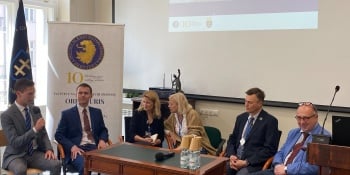
A scientific conference "The Phenomenon of Euthanasia. Interdisciplinary Reflections", co-organized by the Ordo Iuris Institute. During the event, the topic was analyzed from the perspective of medicine, law, sociology, philosophy or theology. Speakers presented, among other things, the legal status related to euthanasia in Poland and other European countries. They pointed out the problems raised by the spread of this procedure. Participants also drew attention to the most important measures to counteract the restriction of the right to life.
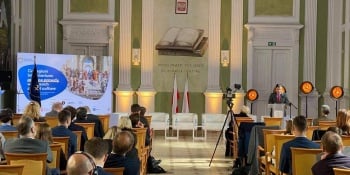
Collegium Intermarium has started its academic year. The inauguration ceremony took the form of an international conference attended by scholars, politicians and commentators from the US, France, Hungary, Croatia and Poland, among other countries. The guests included French politician Marion Maréchal, New York Post columnist Sohrab Ahmari, Prof. Adrian Vermuele from Harvard University, and former Speaker of the Sejm Dr Józef Zych. The conference is titled “Collegium Intermarium: a space for truth in the era of cancel culture”.
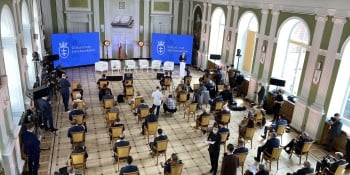
Representatives of state authorities, outstanding academics and journalists from Poland and abroad take part in the conference inaugurating the establishment of Collegium Intermarium. The goal of the new university is to create a platform of co-operation between academics from the Intermarium region. Its flagship field of specialisation is law, but it also offers a rich programme of postgraduate study courses.

An impediment to the realization of real women's rights is the frequent presentation of the concept in ideological ways. One of the most promoted directions in contemporary discourse to realize women's rights is the gender perspective. However, as it turns out, this concept raises a number of doubts, which stem from its strongly ideological nature and lack of effectiveness in real improvement of the situation of women in the world. The second in the series of conferences "In Defense of Women's Rights" was devoted to these issues.
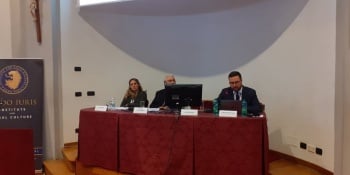
The values which form the basis for law have a profound impact on modern Europe. This was the topic of the House on the Rock “Axiology of Law for the Europe of Tomorrow” Conference, which saw many prominent researchers engage in discussion in Rome. The event was organised by the Ordo Iuris Institute and the Pontifical University of St. Thomas Aquinas.
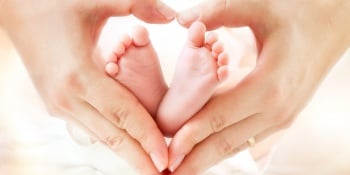
This year marks the 30th anniversary of the adoption of the Convention of the Rights of the Child by Poland.